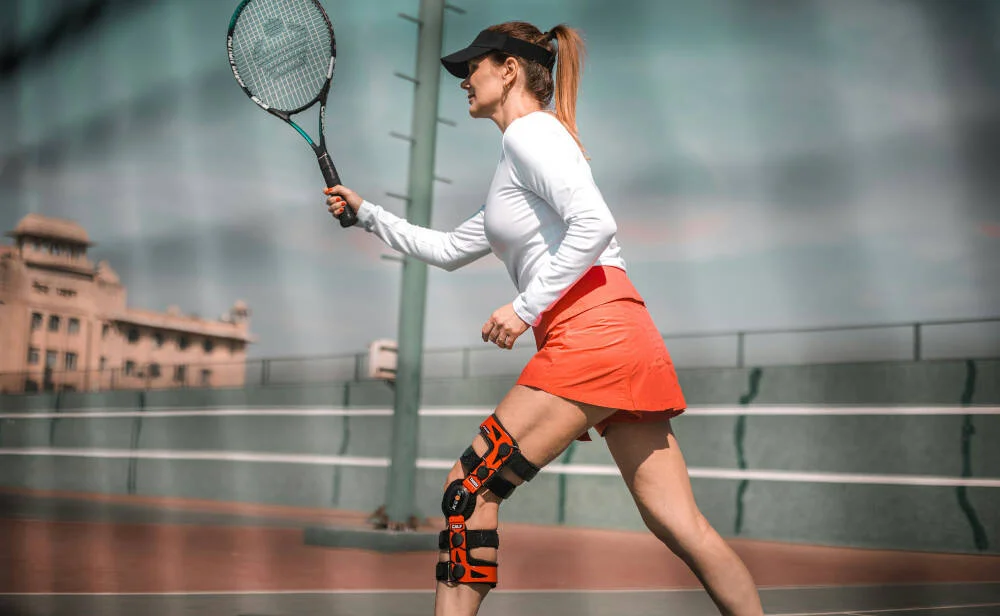Article brought to you by the Kratos Custom Braces specialists from the Alliston and Orangeville physio clinics.
Custom Knee Braces: The Precision Support System
Custom knee braces are meticulously crafted by professionals to fit the unique contours of an individual’s knee joint. Unlike off-the-shelf braces, custom braces are tailored to the athlete’s specific measurements, ensuring optimal fit and support. These braces are typically constructed from lightweight yet durable materials such as carbon fibre or titanium, providing a balance between support and mobility.
One of the key advantages of custom knee braces is their versatility. They possess the ability to address existing knee conditions or injuries while simultaneously preventing further damage. Whether an athlete is recovering from a ligament tear or seeking proactive protection against strains and sprains, a custom knee brace can offer targeted support to stabilize the knee joint during high-impact activities.
Moreover, custom knee braces are engineered to accommodate the biomechanics of various sports, allowing athletes to move with confidence and agility. From basketball players making quick lateral movements to runners pounding the pavement, custom braces provide a personalized support system that adapts to the demands of the sport.
At Kratos Health, we provide you with the in-person clinical assessment for a custom brace, as well as the final brace from our top-of-the-line providers. You can browse the brands on our website, and we ship our products across Canada for your convenience!
Tape: The Flexible Contender
Taping techniques, on the other hand, offer a more flexible approach to knee support. Athletic tape, often made of cotton or synthetic materials, can be applied in various configurations to provide compression, stability, and proprioceptive feedback. Unlike custom knee braces, which remain in place throughout the duration of an activity, tape can be adjusted or reapplied as needed, making it a versatile option for athletes who require dynamic support. You can purchase high quality tape directly from Kratos Health’s website.
One of the primary benefits of tape is its ability to enhance proprioception—the body’s awareness of its position in space. By strategically applying tape to the knee joint, athletes can improve their proprioceptive sense, which may contribute to better balance, coordination, and injury prevention. Additionally, tape can provide compression to reduce swelling and promote blood flow, aiding in the recovery process following strenuous activity.
Furthermore, taping techniques can be tailored to address specific issues or movement patterns unique to individual athletes. Whether it’s correcting patellar tracking or minimizing excessive lateral movement, skilled sports medicine professionals can customize taping protocols to meet the needs of each athlete, regardless of their sport or activity level. Contact us at Kratos Health for further details.
The Verdict: Choosing the Right Support System
So, which is better for sports performance: custom knee braces or tape? The answer, as always, ultimately depends on a variety of factors: including the athlete’s injury history, biomechanics, personal preferences, and budget. While both custom knee braces and tape offer valuable benefits, each has its own strengths and limitations.
For athletes recovering from significant knee injuries or seeking proactive protection against recurring issues, custom knee braces may offer the most comprehensive support. These braces are specifically designed to stabilize the knee joint and mitigate the risk of further injury, making them an ideal choice for athletes with a history of ligament instability or cartilage damage.
On the other hand, tape may be preferred by athletes who prioritize flexibility, adaptability, and proprioceptive feedback. Taping techniques can be easily adjusted to accommodate changes in activity level or address acute issues such as swelling or bruising. Additionally, tape is a cost-effective solution that can be applied on an as-needed basis without the need for specialized equipment or fittings.
Ultimately, the decision between custom knee braces and tape should be made in consultation with a qualified sports medicine professional who can assess the athlete’s unique needs and goals.
Consult the Kratos Health professionals
In the end, whether it’s the precision support of a custom knee brace or the dynamic versatility of tape, the goal remains the same: to empower athletes to perform at their best while minimizing the risk of injury. By understanding the nuances of each support system and consulting with our qualified professionals at Kratos Health, athletes can make informed decisions that enhance their sports performance and promote long-term joint health.
Still sure which option is for you? Contact Kratos Health! We’d love to answer your questions and work with you to achieve your goals. With physical locations in Alliston and Orangeville, and Canada wide shipping, we aim to make custom braces and athletic tape available to as many people as possible.

